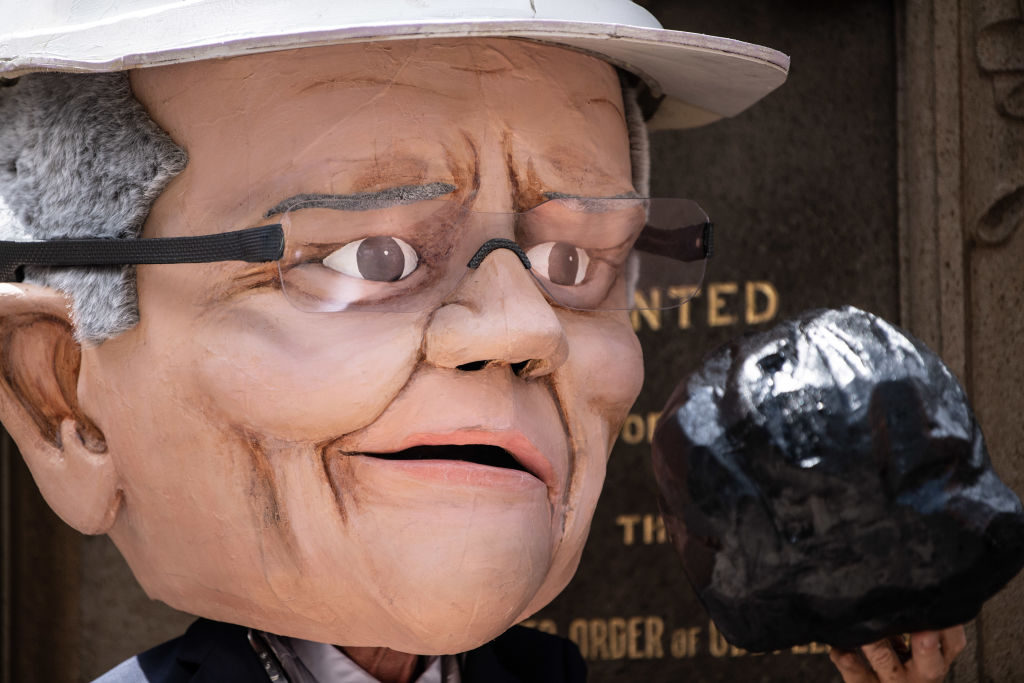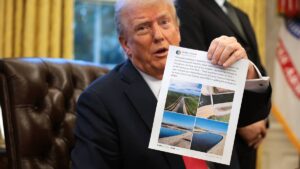Scott Morrison told the mining lobby he wants to put a stop to ‘indulgent and selfish’ business boycotts of coal

A climate protester alluding to Scott Morrison’s affection for coal. Photo by James Gourley, Getty Images
Prime Minister Scott Morrison wants you to know he stands up for one of the most vulnerable segments of the community… the coal industry.
In a Friday speech to the Queensland Resources Council (QRC), Morrison warned of the mounting challenges posed to the beleaguered sector.
“New threats to the future of the resources sector have emerged. A new breed of radical activism is on the march,” he told an industry crowd at the Brisbane Exhibition and Convention Centre, in a speech supplied to Business Insider Australia.
“Apocalyptic in tone. It brooks no compromise. It’s all or nothing. Alternative views are not permitted. It’s a dogma that pits cities against regional Australia. One that cannot resist sneering at the wealth-creating industries of regional and remote Australia,” he explained, in fairly ominous language of his own.
Last month, 300,000 Australians joined millions around the world in taking to the streets to demand climate action. Meanwhile, Extinction Rebellion protestors have taken more extreme measures, gluing themselves to buildings and jumping on top of planes.
“In Queensland and elsewhere, one variant of this new absolutist environmentalism is testing the limits of the right to protest. The right to protest does not mean there is an unlimited licence to disrupt people’s lives and disrespect your fellow Australians,” Morrison said.
“There is no place for economic sabotage dressed up as activism.”
Interestingly, however, Morrison named businesses boycotting coal mines as an “even more worrying development”.
“Some of Australia’s largest businesses are now refusing to provide banking, insurance and consulting services to an increasing number of firms in the coal sector ‒ the nation’s second largest export sector. I think some of our largest corporations should listen to, and engage, their ‘quiet shareholders’, not just their noisy ones,” Morrison said.
He is likely referencing groups such as Market Forces, which provide information on which banks and insurers are lending to fossil fuel industries and encouraging Australians to move their business to those that don’t.
Indeed, in the absence of government policy on climate and energy, Market Forces founder Julien Vincent said activism is what can help transform the Australian economy.
“We still need governments to act but it’s great to know that we’re not limited by that, and can pursue change through our wallets, bank accounts, insurance and super funds,” Vincent told Business Insider earlier this month.
To be clear, there’s no doubt mining makes a large economic contribution to Australia, and specifically to Queensland.
The QRC claims it accounts for a fifth of Queensland’s GDP and one in seven of its jobs. Mind you, Australia-wide those numbers get a lot smaller.
What Vincent and other activists are advocating is a move towards renewable replacements and a substantial re-skilling of the labour force.
While Morrison admits he can’t force businesses to embrace the coal sector, he says he and the Attorney-General are looking into mechanisms that would outlaw “indulgent and selfish” activism.
Given that climate change and the financial decline of the fossil fuels industry are going to happen regardless of an activist ban, it’s unclear how much of a lifeline such “mechanisms” will provide.
Rather than force banks to lend endlessly to the coal mining sector, however, perhaps the government should be more concerned about an Australian export economy heavily reliant on mining, which has rendered its economy as simplistic as far poorer nations like Mali, Senegal and Zimbabwe.
Such dependence, at the expense of developing new sectors, likely poses a greater threat to Australia’s wealth than any protest or business boycott ever will.
This article first appeared on Business Insider Australia, Australia’s most popular business news website. Read the original article. Follow Business Insider on Facebook or Twitter.
UNLOCK INSIGHTS
Discover the untold stories of emerging ASX stocks.
Daily news and expert analysis, it's free to subscribe.
By proceeding, you confirm you understand that we handle personal information in accordance with our Privacy Policy.








